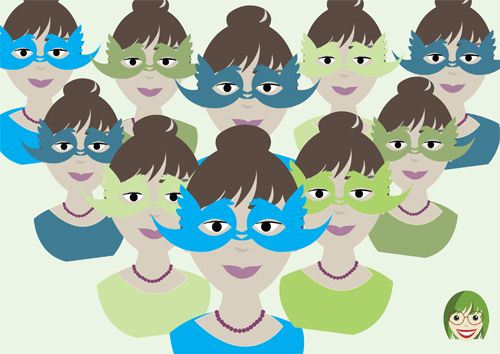
Jen Brister rolls her eyes when the subject is brought up: "Male comics always get asked interesting questions, women just get asked if they think they are funny. If I get asked it these days I just refuse to answer."
It's the question that every female comic dreads: "Are women funny?" There's a simple answer, of course. Some women aren't funny, some most definitely are. The same goes for men.
Yet somehow, this unfortunate stereotype has become an albatross around the necks of female comedians for years. It makes no difference who they are or how good they are at what they do -- when a woman steps on stage she is instantly at a disadvantage; the stereotypes surrounding her gender mean she must often work twice as hard to win over a crowd. She is not judged on her jokes alone, but on her voice, her appearance, her clothes -- everything that makes her a woman.
Of course it's not just in the performance world that this makes a difference. Gender and appearance play a huge role in how we judge the things that people are saying in all walks of life: the jokes that they tell, the advice that they give and the opinions they voice. We treat them differently based on whether a man or a woman is saying them. It's in our nature.
For this reason I think it's time to give Twitter it's due for being a great leveller. There is something incredibly refreshing about a platform that lets the world talk to each other so openly while putting so little emphasis on projected style, gender or personality. For women in particular, many of whom are judged on their appearance every minute of every day, being given a platform where looks and image are given little to no importance is a wonderfully freeing experience.
Writer, critic and broadcaster Bidisha maintains that the female network on Twitter is an increasingly powerful thing:
The sharpest Tweeters I know are women. They pass on outrageous examples of the daily sexism we all face, smart puns, caustic jokes, links to vital articles I need as a human rights advocate, book recommendations, contacts and connections. They combine wicked humour and ardent politics with the global reach that Twitter makes possible. Through them, I make meaningful links with the brilliant people who are changing the world, with a speed and ease that wouldn't have come about without Twitter.
Part of Twitter's power in this aspect comes from its simplicity. Unlike many of its social media cousins, a Twitter profile is largely free from personal clutter -- there are no likes or dislikes, photo albums or lengthy life histories. One can -- if they wish -- mildly customize their profile's appearance, and of course everyone gets their pithy little bio, but in the big wide tweeting world, the only real characterisation that people are afforded comes from two outlets: their tiny picture and their handle. The rest is left solely up to what they want to say -- almost everything that defines a person on Twitter can be found in their tweets.
Liz Bower, actress and comedian, believes that the relative anonymity afforded by Twitter can be a wonderful thing: "Women with high feminine voices often feel they have to lower their voice to be listened to and respected -- Twitter eradicates that." Instead of being judged on their femininity, a comic can be judged purely on the merits of their writing. The neutrality of the platform allows female writers and performers to let their jokes and opinions stand alone, unburdened by preconception.
We should applaud Twitter for levelling the gender playing field -- for giving the power of public perception back to women's words and not their gender. But we must also look at the positive example that this sets us and take the next step, says Jen: "If we could somehow translate what is happening in Twitter to 'real life' the next person that uttered the question 'Are women funny?' would be laughed out of the room."